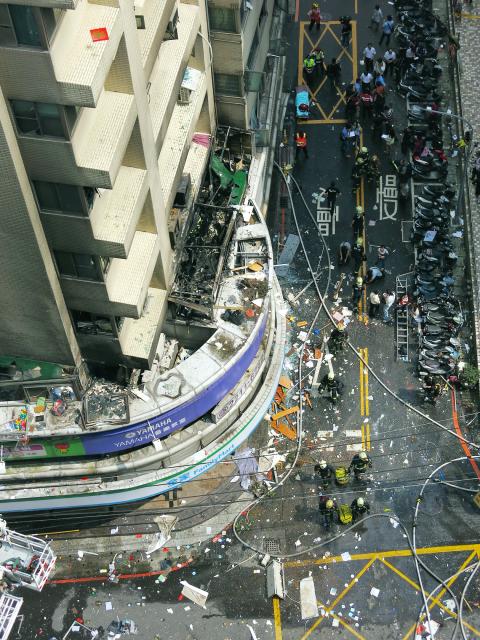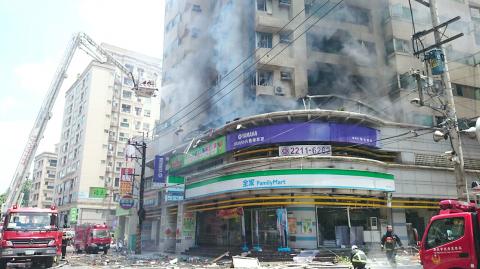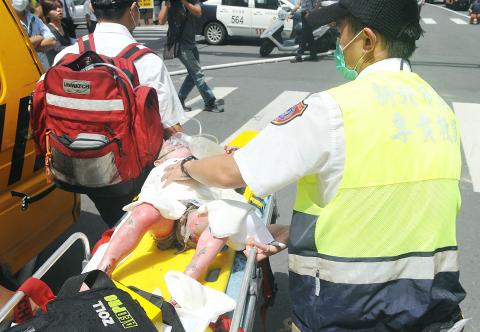A gas explosion ripped through an apartment building in New Taipei City’s Sindian District (新店) near noon yesterday, killing a two-year-old boy and injuring 14 others.
Immediately following the sound of the explosion, black smoke and flames were seen coming out of the third floor of an apartment building on Ankang Road in Sindian District, while broken glass and pieces of sand and concrete rained down on the street below. The force of the blast also broke the windows of buildings across the street.
People quickly ran out of the apartment and nearby buildings as fire trucks rushed to the scene.

Photo: Wen Yu-teh, Taipei Times
Those who escaped said the blast felt “like a huge earthquake.”
A resident surnamed Kao (高) said the windows on the building’s first to sixth floors were shattered and glass shards flew as far as 10m from the site of the blast.
Firefighters soon put out the fire and conducted a floor-by-floor search. They found 14 injured people, including a rescue worker surnamed Chang (張).

Photo: Yu Sheng-lun, Taipei Times
A two-year-old boy surnamed Chen (陳) was rushed to hospital, but was declared dead on arrival.
The New Taipei City Fire Department said the explosion occurred in the master bedroom of an apartment on the third floor of the building, where the two-year-old, his three-year-old sister and their grandmother were staying.
However, the fire chief said they were still investigating whether the leak came from the natural gas pipe leading into the apartment — which would be the responsibility of the gas company — or whether it occurred in the section of the pipe inside the apartment leading to the kitchen — which would be the responsibility of the residents.

Photo: Liao Chen-huei, Taipei Times
At press time, the grandmother, who was sent to Wan Fang Hospital in Taipei, was unconscious. She has second-degree burns covering 90 percent of her body, as well as bone fractures, the fire department said.
The three-year-old girl is conscious, but has second-degree burns over 80 percent of her body. She is being treated at Mackay Memorial Hospital in Taipei, the department said.
The chief executive of the apartment building’s management committee, surnamed Lin (林), accused Shin Shin Natural Gas Co (欣欣天然氣) of failing to properly handle a suspected natural gas leak on Thursday.
“Some residents said they could smell gas in the air at around 5pm yesterday [Thursday]. We immediately contacted Shin Shin and technicians from the company arrived at 5:25pm,” Lin said. “However, instead of using equipment for an inspection, they merely took a sniff and told us it was marsh gas and there was nothing to worry about.”
New Taipei City Deputy Mayor Hou You-yi (侯友宜), who inspected the scene of the accident yesterday afternoon, promised that the city would pursue those responsible and make sure that residents could return home safely last night.
“The city government will launch a probe into the responsibility of Shin Shin Natural Gas and will refer the case to prosecutors to make sure that those who should be held responsible will not escape their responsibility,” he said.
Additional reporting by CNA

CHAOS: Iranians took to the streets playing celebratory music after reports of Khamenei’s death on Saturday, while mourners also gathered in Tehran yesterday Iranian Supreme Leader Ayatollah Ali Khamenei was killed in a major attack on Iran launched by Israel and the US, throwing the future of the Islamic republic into doubt and raising the risk of regional instability. Iranian state television and the state-run IRNA news agency announced the 86-year-old’s death early yesterday. US President Donald Trump said it gave Iranians their “greatest chance” to “take back” their country. The announcements came after a joint US and Israeli aerial bombardment that targeted Iranian military and governmental sites. Trump said the “heavy and pinpoint bombing” would continue through the week or as long

TRUST: The KMT said it respected the US’ timing and considerations, and hoped it would continue to honor its commitments to helping Taiwan bolster its defenses and deterrence US President Donald Trump is delaying a multibillion-dollar arms sale to Taiwan to ensure his visit to Beijing is successful, a New York Times report said. The weapons sales package has stalled in the US Department of State, the report said, citing US officials it did not identify. The White House has told agencies not to push forward ahead of Trump’s meeting with Chinese President Xi Jinping (習近平), it said. The two last month held a phone call to discuss trade and geopolitical flashpoints ahead of the summit. Xi raised the Taiwan issue and urged the US to handle arms sales to

State-run CPC Corp, Taiwan (CPC, 台灣中油) yesterday said that it had confirmed on Saturday night with its liquefied natural gas (LNG) and crude oil suppliers that shipments are proceeding as scheduled and that domestic supplies remain unaffected. The CPC yesterday announced the gasoline and diesel prices will rise by NT$0.2 and NT$0.4 per liter, respectively, starting Monday, citing Middle East tensions and blizzards in the eastern United States. CPC also iterated it has been reducing the proportion of crude oil imports from the Middle East and diversifying its supply sources in the past few years in response to geopolitical risks, expanding

Pro-democracy media tycoon Jimmy Lai’s (黎智英) fraud conviction and prison sentence were yesterday overturned by a Hong Kong court, in a surprise legal decision that comes soon after Lai was jailed for 20 years on a separate national security charge. Judges Jeremy Poon (潘兆初), Anthea Pang (彭寶琴) and Derek Pang (彭偉昌) said in the judgement that they allowed the appeal from Lai, and another defendant in the case, to proceed, as a lower court judge had “erred.” “The Court of Appeal gave them leave to appeal against their conviction, allowed their appeals, quashed the convictions and set aside the sentences,” the judges